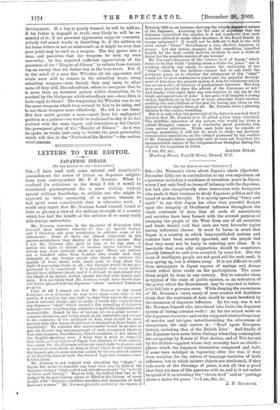[To THE EDITOR OF TEE "SPECTATOR."
Snt,—Mr. Norman's views about Japan's ideals (Spectator December 12th) are in contradiction to my own experience, an experience including a residence of seventeen years in Japan, where I not only lived on terms of intimacy with the Japanese, but had also exceptionally close intercourse with foreigners who made it their business to study Japanese polities and the trend of modern thought. It is merely spreading "fancy and myth" to say that Japan has other than peaceful designs upon the integrity of Occidental influence throughout the whole continent of Asia, that all sorts of associations and societies have been formed with the avowed purpose of sweeping the people of the West from out of all countries and lands Asiatic, and that such are very favourite topics among influential classes. It must be borne in mind that Japan is a country in which long-established notions and customs have been recently uprooted, and the people feel that they must not be hasty in rejecting new ideas. It is inevitable that even silly suggestions should be sometimes gravely listened to, and even accepted, by some few. But the mass of intelligent people are not good soil for such seed; it may spring up, but it withers away. It is not difficult to cull from newspapers in Japan reports of sayings and doings which reflect little credit on the participators. The same thing might be done in any country. But 'to consider these as typical of the state of public opinion, as an indication of the policy which the Government may be expected to follow, is to fall into a grievous error. While denying the correctness of Mr. Norman's views, many of your readers will doubtless think that the continent of Asia would be much benefited by the extension of Japanese influence. By the way, was it not Mr. Norman himself who introduced into India the Japanese system of boring artesian wells ? As for the attack made on the Japanese character, and on the supposed relative frequency of murder and intrigue, notwithstanding the odiousness of comparison, the only answer is : " Read again European history, including. that of the British Isles." And finally, if the Japanese have some bitter feelings when they contemplate the occupation by Russia of Port Arthur, and of Wei-hai-wei by the British—against whom they certainly have no illwill- places which the Japanese themselves conquered and held, if some have indulged in vapouring after the war, if they form societies for the reform of language (societies of little influence, but to which sinister objects are attributed), if they talk much of the blessings of peace, is not all this a proof that they are men of like passions with us, and is it not unfair to speak of it as revealing the " cloven hoof " and as " pratings about a desire for peace " ?—I am, Sir, &c.,
J. N. SEYMOUR.






































 Previous page
Previous page